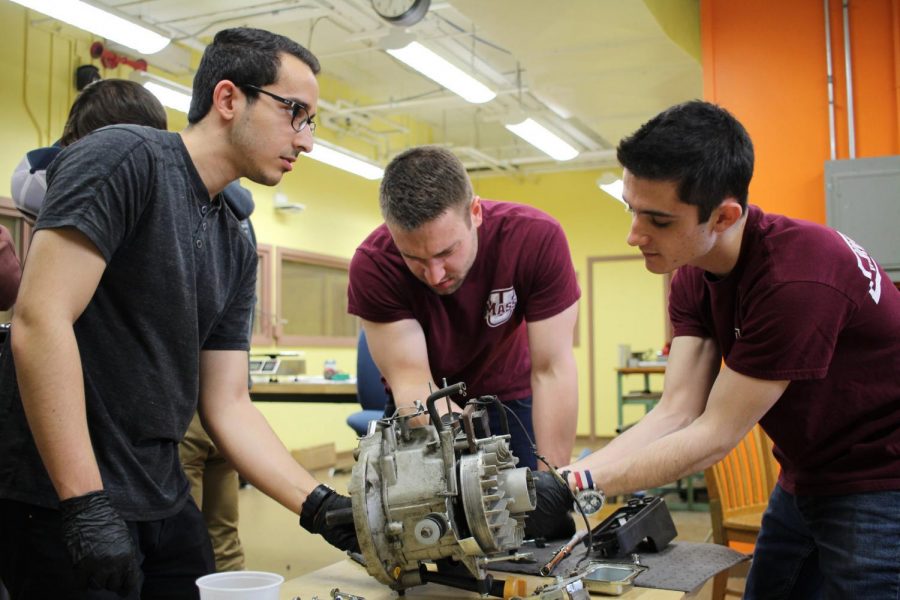In the minutes leading up to 7 p.m., backpack-toting students in their motley attire filter into a starkly lit classroom in the Engineering Lab. They chat idly about late nights studying and professors with high expectations. They could be waiting for any review session, or a late-night exam. But these roughly two-dozen students are gathered to bring clean water to a community in sub-Saharan Africa.
This is one of two semi-weekly meetings of the University of Massachusetts chapter of Engineers Without Borders, a group of student and faculty volunteers who collaborate on solutions to public health issues in developing countries.
The UMass chapter, founded in 2006, currently works to provide access to clean water in rural communities in Kenya and Ghana, and previously did work in the Amazon.
The work the group has completed has brought significant improvement in the lives of villagers in Kenya and Ghana. According to the Engineers without Borders page on the UMass website, “[UMass engineering students’] work, part of the UMass Amherst chapter of Engineers Without Borders, may be the proverbial drop in the bucket of the water-scarce continent, but to the villagers, clean and sustainable water has dramatically improved their lives.”
The agenda for that Tuesday night was research on the best method for increasing the yield of out-of-repair boreholes, a specialized type of well, in the Ghanaian community of Saviefe-Deme. Each group spent the hour-long meeting researching one of three methods reported their findings at the end.
The group’s relationship with Saviefe-Deme extends back to 2013, and a portion of the team has travelled to Saviefe-Deme each August since 2015 to build the projects they spend all year planning. Working closely with the community members and with a Ghanaian non-governmental organization, the students assessed the needs of the community and came up with a game plan.
The ultimate goal is to build a water distribution system for the community of 500 — a pipeline running through the center of the community, making it easier to access clean water. The central pump would be a public resource, and individuals could then pay to have pipes built to their houses.
The project is expected to take two or three more years, because it is logistically complex and the students need to seek approval from the Ghanaian government.
Saviefe-Deme is in a region of Ghana whose access to water is strongly affected by seasonal changes, and during the dry season, many people in the community need to travel long distances back and forth to water sources. Much of the water that is available is contaminated with E. coli and other pathogens. The cleanest sources of water are the boreholes, which the team is currently preparing to update to increase their yield.
Ahead of the pipeline project, the group has focused on smaller, more immediately effective projects, including this year’s borehole project. Two years ago, the team installed rainwater catchment systems, which capture rainwater and store it for later use at the kindergarten and primary schools in Saviefe-Deme. Just this past August, the team built nine biosand filters, which the community can use to clean their groundwater.
The program is fundamentally built around collaboration with the community. The group has worked with the locals throughout the decision-making and implementation processes. They consult with their local contact Charles Nutsukpui about the needs of the community, and through him get input throughout the year on the best ways to help them meet their water goals.
According to Samantha LeValley, junior mechanical engineering major and the UMass chapter’s vice president of operations, all the tools and materials used in EWB projects are locally available in the community. The team doesn’t use electricity if they can help it, and they ensure that the members of the community have the resources to make repairs and expand upon the projects.
Take the biosand filters for example. Because of unexpected obstacles during the trip, the team built one less filter than they planned. On top of this, they left materials for five extra, which the people of Saviefe-Deme now have the expertise to construct and maintain.
This expertise in building goes both ways, according to Victoria Hennon, senior civil engineering major and the chapter’s social chair. In Ghana, she says, they believe “America overdesigns their structures.”
“They laugh at us when we use a tape measure. They just keep saying ‘around, around,’” she added.
But the group agrees that that estimation and intuition was often as effective, if not more so, than the engineering students’ precise measurements.
Isabella Cobble, senior environmental engineering major, president of the UMass chapter and former Kenya project manager, started with the group in September of her freshman year, and by January, was on the plane to Kenya to help assess the needs of the community.
The group, she said, is a tremendous learning experience for everyone involved. Upperclassmen mix with and mentor underclassmen, and her passion for the work the group does inspired her to work harder in general.
According to Marzbed Margossian, fifth year chemistry major and former project manager for Ghana, this year-round work and commitment to collaboration and connection with the community sets Engineers Without Borders apart from other service groups, where he says students “pay $7,000 to do some work, get their pictures and leave.”
Here, the students are involved every step of the way, but it’s not about them.
Megha Shah, junior chemical engineering major, Ghana project manager and chapter treasurer, says the projects belong to the community.
“Everything is based on what they want to do — we just help,” Shah said.
Ben Powell can be reached at [email protected].



















